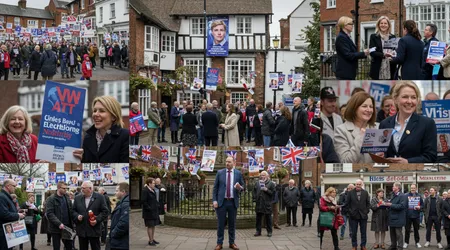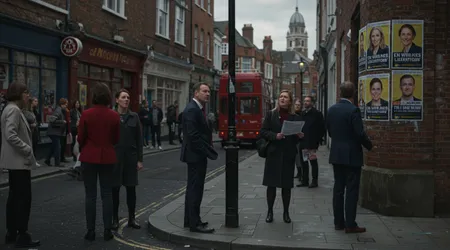England Prepares for Pivotal Local Elections That Could Reshape Party Politics

England prepares for pivotal local elections this Thursday, May 1, 2025, a moment that could redraw the political map.
With 1,631 council seats and six mayoral contests at stake, voters are poised to deliver a verdict on Labour’s government, the Conservatives’ new leadership, and Reform UK’s rising influence.
Polls hint at a fractured landscape, where no single party may dominate. This election, smaller due to Labour’s local government restructuring, still carries seismic potential.
Will it signal the end of the two-party grip? Let’s unpack the stakes, dynamics, and what’s driving this electoral crossroads.
The context is clear: dissatisfaction with the status quo is palpable.
Since Labour’s general election win in July 2024, public frustration has grown over issues like winter fuel allowance cuts and high immigration levels.
The Conservatives, under Kemi Badenoch, face a test of relevance, while Nigel Farage’s Reform UK aims to capitalize on voter discontent.
Smaller parties like the Liberal Democrats and Greens are also in the mix, ready to snatch seats in a multiparty melee.
This article dives into why England prepares for pivotal local elections, exploring the forces at play and what the results might mean for the future.
The Stakes: Why These Elections Matter
Voters are restless, and England prepares for pivotal local elections that could amplify their discontent.
Only 11 million are eligible to vote 25% of last year’s general election turnout yet the outcomes will reverberate nationally.
These elections test Labour’s ability to hold power locally while governing centrally, a balancing act Sir Keir Starmer has struggled with.
A YouGov poll predicts Labour losing all four combined authority mayoral races, a stinging rebuke for a party barely a year into government.
The Conservatives, defending 19 of 23 councils, risk a rout. Badenoch’s leadership, still untested at the ballot box, faces scrutiny as Reform UK poaches Tory voters.
For Farage, this is a chance to cement Reform as a credible force, potentially overtaking the Tories in council seats.
The Liberal Democrats and Greens, meanwhile, eye gains in areas like Gloucestershire and the West of England, where tight races could tip councils into no overall control.
Beyond party fortunes, these elections gauge public trust. Issues like council tax hikes, housing shortages, and local services dominate voter concerns.
A fragmented result could embolden calls for proportional representation, challenging the first-past-the-post system.
England prepares for pivotal local elections not just to elect councillors but to signal broader political realignment.
++ Populist Reform UK Poised for Breakthrough in Local Elections, Challenging Conservative Dominance
The scale of the challenge is stark. Labour’s autumn budget, criticized for austerity measures, has eroded goodwill.
In Durham, a Labour stronghold, a coalition of Tories, Lib Dems, and independents has kept them out of power since 2021.
A poor showing here could expose cracks in Starmer’s base. Similarly, the Tories’ grip on Buckinghamshire, a “blue fortress,” is under threat from defections to Reform.
England prepares for pivotal local elections where every seat counts in a multiparty slugfest.

The Rise of Reform UK: A Game-Changer?
Nigel Farage smells opportunity as England prepares for pivotal local elections. Reform UK, once dismissed as a Brexit relic, is polling ahead of the Tories in some areas.
A March 2025 poll by Merlin Strategies suggested Reform could outstrip the Conservatives in councillor numbers, a seismic shift if realized.
Farage’s pitch anti-establishment, anti-immigration resonates in northern towns like Hull, where Labour’s grip is loosening.
Also read: UK Becomes First European Country to Ban SIM Farm Devices to Combat Fraud
Reform’s strategy is grassroots and relentless. From a former police station in Dover, campaigners have used WhatsApp to mobilize, poaching 80 Tory candidates and staff since last year’s general election.
Their message of “common sense” politics appeals to voters disillusioned with Westminster’s polish.
In Lincolnshire, Reform leads polls for the inaugural mayoral race, a potential upset that could redefine right-wing politics.
But Reform’s rise isn’t without risks. Their limited track record only two council seats won in 2021, neither contested this year means they’re untested in governance.
Critics argue Farage’s charisma masks thin policy substance. Will voters trust them to deliver bin collections and road repairs?
England prepares for pivotal local elections where Reform’s momentum meets the reality of local accountability.
The ripple effects are already visible. In Tameside, Reform’s Allan Hopwood became Greater Manchester’s first elected Reform councillor in a by-election this April.
Read more: UK Lifts Sanctions on Syrian Ministries Following Regime Change
This victory, in a Labour-leaning area, signals Reform’s potential to disrupt.
Yet, their focus on national issues like immigration may alienate voters prioritizing potholes over polemics.
England prepares for pivotal local elections where Reform must prove it’s more than a protest vote.
Labour’s Tightrope: Governing Amid Discontent
Starmer’s Labour is bracing for a bruising as England prepares for pivotal local elections. Governing parties often struggle in local polls, but Labour’s challenges are acute.
The winter fuel allowance cuts sparked outrage, with only one in ten respondents in a Sky News focus group willing to give Labour time to deliver.
High immigration and sluggish progress on promises like NHS reform have further eroded trust.
In mayoral races, Labour faces humiliation. Neither incumbent Labour mayor in Cambridgeshire or the West of England is standing again, and YouGov predicts losses in all four contests.
In Hull, Labour’s candidate battles Reform’s boxing star, a populist wildcard.
Starmer’s absence from campaign broadcasts suggests a deliberate low profile, but can he dodge the fallout?
Labour’s defense is that local elections reflect national moods, not just local performance. They point to inherited economic woes and the need for tough choices.
Yet, in places like Runcorn and Helsby, where a by-election coincides with local polls, Labour’s candidate faces backlash over ex-MP Mike Amesbury’s assault conviction.
England prepares for pivotal local elections where Labour’s brand is on trial.
The party’s strategy is to attack Reform’s credibility while highlighting local achievements, like Durham’s investment in schools.
But with independents and Greens siphoning votes, Labour risks being squeezed. A bad night could fuel calls for a leadership rethink, with some voters already naming replacements for Starmer.
England prepares for pivotal local elections where Labour must navigate a minefield of discontent.
The Conservatives: Badenoch’s Baptism by Fire
Kemi Badenoch faces a daunting debut as England prepares for pivotal local elections. The Tories, battered by their 2024 general election loss, defend most seats but expect to lose over half.
Badenoch has admitted the challenge is “extremely difficult,” with defections to Reform and strong Lib Dem campaigns in the south threatening historic strongholds like Gloucestershire.
The last time these seats were contested, in 2021, Boris Johnson’s vaccine boost buoyed the Tories. Now, post-partygate and economic turmoil, they’re on the ropes.
In Northumberland, their minority administration teeters as Labour, Reform, and independents vie for gains. A collapse here could undermine Badenoch’s authority, fueling internal unrest.
Badenoch’s pitch is renewal: a leaner, more principled Conservatism. She’s distanced herself from Johnson’s populism, but voters associate her party with past failures.
In Wiltshire, where Tories tout financial stability, Reform’s “normal people” rhetoric is gaining traction.
England prepares for pivotal local elections where the Tories must convince voters they’re still relevant.
The analogy is a ship in a storm: Badenoch is the new captain, but the crew is mutinous, and Reform’s pirate flag looms.
Can she steer to safety? The Tories’ local campaign emphasizes bread-and-butter issues like roads, but national disillusionment may overshadow these efforts.
England prepares for pivotal local elections where Badenoch’s leadership hangs in the balance.
Smaller Parties: The Lib Dems and Greens Step Up

The Liberal Democrats and Greens are poised for breakthroughs as England prepares for pivotal local elections.
The Lib Dems, strong in southern councils, could capitalize on Tory weakness in places like Gloucestershire, where they’re polling neck-and-neck.
The Greens, meanwhile, lead in the West of England mayoral race, with Mary Page at 27% against Labour’s 23%, per YouGov.
These parties thrive on hyper-local issues. In Oxford, a Green-led campaign on traffic reduction has galvanized voters, though Reform’s national pull might dilute their gains.
The Lib Dems’ knack for community organizing think leaflets and door-knocking gives them an edge in tight races. Their slogan, “Listening to You,” resonates in areas fed up with Westminster.
However, smaller parties face structural hurdles. First-past-the-post favors big players, and vote-splitting could hand seats to Reform or Labour.
In Durham, a multi-party coalition has kept Labour out, but replicating this elsewhere requires discipline. England prepares for pivotal local elections where tactical voting will be key.
The Greens’ rise in Bristol, where they’ve pushed for affordable housing, shows their potential to disrupt.
Yet, their focus on progressive ideals sometimes clashes with rural voters’ priorities, like farming subsidies. The Lib Dems, balancing pragmatism and reform, could emerge as kingmakers in hung councils.
England prepares for pivotal local elections where smaller parties could tip the scales.
The Broader Implications: A New Political Era?
These elections are a litmus test for Britain’s political future as England prepares for pivotal local elections.
A fragmented result could accelerate the decline of two-party dominance, a trend evident since the 2024 general election’s multiparty surge.
The Guardian argues this week’s polls might mark “the end of two-party dominance,” with proportional representation gaining traction.
| Party | Seats Contested | Predicted Gains/Losses | Key Battlegrounds |
|---|---|---|---|
| Labour | 400 | -50 to -100 | Durham, Hull, Runcorn |
| Conservatives | 900 | -400 to -500 | Buckinghamshire, Gloucestershire |
| Reform UK | 300 | +50 to +100 | Lincolnshire, Northumberland |
| Liberal Democrats | 250 | +50 to +80 | Gloucestershire, Wiltshire |
| Greens приказать 100 | +20 to +40 | West of England, Bristol |
This table underscores the multiparty battle. Reform’s projected gains, if realized, could position them as Labour’s main challenger by 2030.
For example, in Hull, a Labour voter named Sarah told the BBC she’s switching to Reform over immigration concerns, a sentiment echoed in northern towns.
In contrast, a Gloucestershire retiree, John, backs the Lib Dems for their pothole repair pledges, showing local issues’ sway.
The broader question is whether Britain’s political system can adapt. A hung council in Northumberland, with no party securing a majority, mirrors national fragmentation.
If voters reward smaller parties, pressure for electoral reform will grow. England prepares for pivotal local elections that could usher in a new, messier political era.
Consider the 2010 coalition government: a rare multiparty experiment that left voters wary of power-sharing.
Today’s elections could normalize such arrangements locally, setting a precedent for Westminster.
But fragmentation risks voter fatigue only 45% of 11-to-25-year-olds are interested in politics, per a 2025 Electoral Commission report.
England prepares for pivotal local elections where engagement is as crucial as ideology.
Conclusion: A Nation at a Crossroads
As England prepares for pivotal local elections, the nation stands at a political inflection point. Labour’s struggles, Reform’s surge, and the Tories’ decline signal a electorate hungry for change.
Smaller parties, from the Greens to the Lib Dems, are ready to exploit this discontent, while independents add unpredictability.
The results, due Friday, May 2, 2025, will shape party strategies and voter trust ahead of the next general election.
This isn’t just about who controls councils; it’s about whether Britain’s political system can reflect its diverse voices.
A fragmented outcome might spark reform, but it could also deepen cynicism if promises falter. For now, voters hold the pen, ready to write the next chapter.
Will they demand a new story, or cling to familiar pages? England prepares for pivotal local elections and the world is watching.
Frequently Asked Questions
Q: Which areas are voting in the 2025 local elections?
A: Twenty-three councils, including Buckinghamshire, Durham, and Northumberland, plus six mayoral races, like West of England and Lincolnshire.
Q: Can Reform UK really overtake the Conservatives?
A: Polls suggest Reform could win more councillors, but their lack of local governance experience may limit their impact.
Q: How will these elections affect national politics?
A: A poor Labour showing could weaken Starmer, while Reform’s gains might reposition the right, challenging Tory dominance.
Q: Why are some councils not voting this year?
A: Nine areas, like Surrey, postponed elections to 2026 due to Labour’s local government reorganization.
